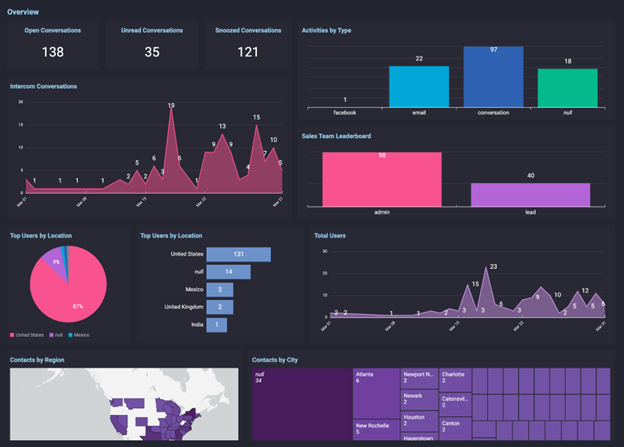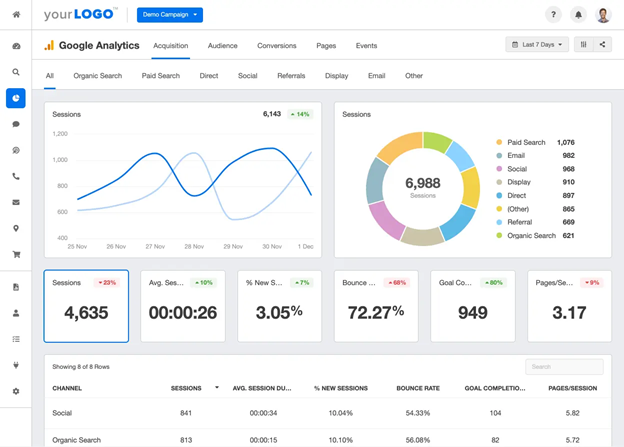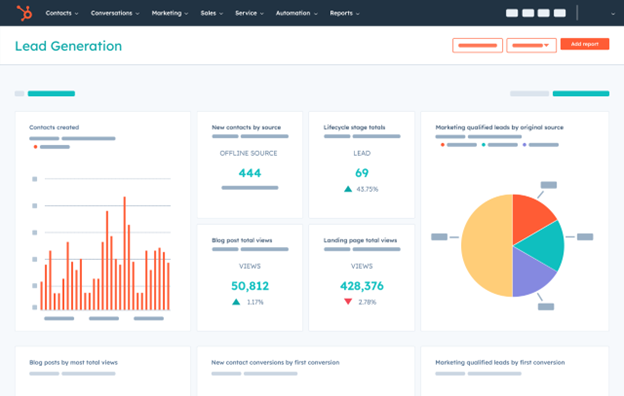In today's data-driven business landscape, the importance of sales analytics software cannot be overstated. It serves as the compass that guides your sales strategies, enabling you to make informed decisions, optimize processes, and ultimately drive revenue growth.
However, with a plethora of options available, choosing the right sales analytics software for your business can be a daunting task. In this article, we will delve into the essential considerations and provide valuable insights to help you navigate this crucial decision-making process.
Our primary focus will be on Content Marketing Analytics, a pivotal component of sales analytics that plays a pivotal role in shaping your marketing and sales strategies.
Stats and Facts:
- According to a survey by Dresner Advisory Services, 57% of organizations consider sales analytics crucial for their business operations.
- The global sales analytics market is projected to reach $10.9 billion by 2026, growing at a CAGR of 10.6% from 2021 to 2026 (Source: MarketsandMarkets).
- Content marketing analytics can increase lead generation by up to 67% (Source: HubSpot).
- Businesses that effectively use sales analytics are 58% more likely to beat their revenue goals (Source: Aberdeen Group).
What is Sales Analytics Software?
Sales analytics software is a powerful tool designed to gather, analyze, and interpret data related to a company's sales activities and performance. In today's highly competitive business landscape, where data is often considered the new currency, this software has become indispensable.
It enables organizations to gain valuable insights into their sales processes, customer behavior, and market trends, ultimately leading to more informed decision-making and the ability to fine-tune sales strategies for improved performance and profitability.
With the continuous influx of data generated through various channels, sales analytics software is the key to unlocking a deeper understanding of customer preferences, optimizing sales pipelines, and achieving sustainable growth in the modern business world.
Benefits of Using the Sales Analytics Software for Business
Sales analytics software offers several significant benefits for businesses:
Data-Driven Decision Making
Sales analytics software empowers organizations to make informed decisions based on real-time data and historical trends. By analyzing sales data, customer behaviors, and market dynamics, businesses can adjust strategies quickly, allocate resources efficiently, and identify areas for improvement, ensuring that every decision is grounded in data-backed insights.
Improved Sales Performance
This software provides a comprehensive view of sales operations, helping teams identify bottlenecks, optimize processes, and enhance sales efficiency. It enables sales representatives to focus on high-potential leads, resulting in increased conversions and revenue.
Additionally, sales managers can use performance metrics to provide targeted coaching and training to their teams, fostering continuous improvement.
Competitive Advantage
Leveraging sales analytics software allows companies to stay ahead of the competition. By tracking market trends, monitoring competitor activities, and assessing customer preferences, businesses can adapt their strategies proactively.
This gives them a competitive edge by responding quickly to changing market conditions and delivering products and services that align with customer demands.
Identifying Growth Opportunities
Sales analytics software uncovers hidden growth opportunities within existing customer bases and new markets. By segmenting data and conducting customer profiling, businesses can identify niches, upsell and cross-sell products, and tailor marketing efforts for maximum impact. This proactive approach to growth can lead to increased market share and revenue expansion.
Factors to Consider When Choosing Sales Analytics Software
When choosing sales analytics software, several critical factors must be considered to ensure the selection aligns with your business needs and objectives:
Data Integration
The software's ability to seamlessly integrate with your existing data sources, such as CRM systems, marketing platforms, and ERP systems, is crucial. This factor impacts the decision by ensuring that all relevant data is accessible and can be analyzed in one central location, enabling a holistic view of your sales operations.
Ease of Use
User-friendliness is paramount. An intuitive interface and straightforward navigation can greatly impact user adoption and productivity. It's essential to choose software that your team can quickly learn and use effectively, as complex or cumbersome tools may hinder the decision-making process.
Customization and Flexibility
Every business has unique requirements. A software solution that offers customization options and flexibility allows you to tailor the analytics to your specific needs, ensuring that the insights generated are relevant and actionable.
Real-time Reporting
Timely insights are crucial for agile decision-making. The ability to generate real-time reports and dashboards ensures that your team can react promptly to changing market conditions and customer behaviors.
Data Accuracy and Reliability
Inaccurate data can lead to misguided decisions. It's essential to choose software that maintains data accuracy and reliability through robust data cleansing, validation, and error-checking mechanisms.
Advanced Analytics Capabilities
Depending on your business's complexity, you may require advanced analytics features such as predictive analytics, machine learning, or AI-driven insights. These capabilities can significantly enhance your ability to forecast sales trends and make proactive decisions.
Scalability
As your business grows, so do your data needs. Ensure that the chosen software can scale with your organization, accommodating increased data volumes and user requirements without significant disruptions.
Security and Compliance
Protecting sensitive sales data is paramount. The software should adhere to stringent security protocols and compliance standards to safeguard your information and maintain regulatory compliance.
Training and Support
Adequate training and support resources are vital for effective software utilization. Ensure that the software provider offers comprehensive training materials, documentation, and responsive customer support to assist with any issues or questions that may arise.
Cost-effectiveness
Evaluate the total cost of ownership, considering not just the initial purchase cost but also ongoing licensing fees, maintenance, and any additional expenses related to customization or integration.
Integration with Other Systems
The ability of the software to integrate seamlessly with other critical business systems, such as finance or inventory management, is essential for a unified view of operations and streamlined processes. This factor ensures data consistency and reduces manual data entry.
Various Features of Sales Analytics Software
Sales analytics software offers a range of essential features to empower businesses with data-driven insights:
Data Collection
At the core, sales analytics software efficiently collects and consolidates data from various sources, such as CRM systems, website interactions, and transaction records. This feature ensures that all relevant information is readily available for analysis.
Data Visualization
To make complex data comprehensible, these tools employ data visualization techniques like charts, graphs, and heatmaps. This visual representation helps users quickly grasp trends and patterns within their sales data.
Reporting and Dashboards
Robust reporting capabilities enable users to generate custom reports and interactive dashboards. These features provide a snapshot of key performance metrics and offer the ability to drill down into specific details for deeper analysis.
Sales Forecasting
Sales analytics software leverages historical data and statistical models to provide accurate sales forecasts. This feature is invaluable for anticipating future demand, optimizing inventory levels, and allocating resources effectively.
Sales Performance Analysis
Businesses can track and evaluate the performance of individual sales representatives, teams, or territories. Detailed insights into sales activities, conversion rates, and revenue contribution help identify areas for improvement.
Customer Segmentation
Segmentation tools categorize customers based on various criteria, such as demographics, purchase history, or behavior. This enables targeted marketing campaigns, personalized customer experiences, and more effective sales strategies.
Sales Funnel Analysis
Sales analytics software helps visualize the sales funnel, from lead generation to conversion. This feature identifies bottlenecks, drop-off points, and opportunities for optimization throughout the sales process.
Win/Loss Analysis
Understanding why deals are won or lost is critical. Sales analytics software provides the means to analyze the factors contributing to successful sales outcomes, enabling businesses to replicate successful strategies and address shortcomings.
3 Best Sales Analytics Software for Business
Arena Calibrate
Arena Calibrate is a powerful and versatile sales analytics software solution that stands out as one of the best options for businesses aiming to optimize their sales strategies. With its robust suite of features, this tool enables companies to gain deeper insights into their sales performance, customer behaviors, and market trends.
It offers real-time data visualization, forecasting tools, and advanced analytics capabilities, allowing businesses to make data-driven decisions, identify sales opportunities, and streamline their sales processes.
This tool is a user-friendly interface and customizable dashboards make it accessible for teams of all sizes, while its ability to integrate with various data sources ensures seamless data management. Whether you're a small startup or a large enterprise, Arena Calibrate empowers businesses to fine-tune their sales efforts, enhance customer relationships, and ultimately drive revenue growth.

Zendesk Sell

Zendesk Sell is a powerful customer relationship management (CRM) software that caters to sales teams and businesses, helping them streamline their sales processes and improve customer engagement.
Formerly known as Base CRM, Zendesk Sell offers a user-friendly interface, robust contact and lead management tools, email automation, sales pipeline tracking, and advanced analytics. It empowers sales professionals with the insights and automation needed to optimize their workflow, close deals more efficiently, and cultivate stronger customer relationships.
HubSpot Sales Hub

HubSpot Sales Hub is a comprehensive sales automation and CRM platform offered by HubSpot, designed to empower sales teams and professionals with the tools needed to streamline their processes, increase productivity, and drive revenue growth.
It encompasses features such as contact and lead management, email automation, sales analytics, deal tracking, and customizable reporting, all within an intuitive and user-friendly interface.
HubSpot Sales Hub also integrates seamlessly with other HubSpot marketing and customer service tools, providing a unified platform for managing and nurturing leads, closing deals, and delivering exceptional customer experiences.
Conclusion
In conclusion, choosing the right sales analytics software is a pivotal decision that can significantly impact the success of your business. As highlighted in this article, sales analytics tools offer the means to gain deeper insights into your sales strategy, optimize performance, and stay ahead of the competition.
By harnessing the power of data-driven decision-making, businesses can make more informed choices, enhance sales performance, identify growth opportunities, and ultimately achieve sustainable growth. Embracing sales analytics isn't just a choice; it's a strategic imperative in today's competitive landscape.
FAQ of Choosing the Right Sales Analytics Software
Does the sales analytics software work with CRM and other sales tools?
Yes, sales analytics software commonly integrates with CRM systems, marketing tools, data sources, custom sales tools, and even business intelligence (BI) platforms to provide a comprehensive view of sales operations and enable data-driven decision-making.
Is the sales analytics software cost-effective considering its features and capabilities?
Sales analytics software can be cost-effective considering the benefits it offers, such as improved efficiency, data-driven decisions, reduced risk, scalability, and a competitive advantage. However, the cost-effectiveness varies based on factors like the software's features, your business size, and specific needs. Evaluating ROI potential and pricing models is crucial for determining cost-effectiveness.
How does the software measure the ROI of sales and marketing campaigns?
Sales analytics software measures the ROI of sales and marketing campaigns by tracking conversions, attributing revenue to specific campaigns, recording campaign costs, and analyzing the customer lifecycle. It calculates ROI using a formula and provides real-time dashboards and reports for performance tracking and optimization.
Are there any case studies demonstrating the software's impact on other businesses?
Yes, there are numerous case studies and success stories showcasing the impact of sales analytics software on businesses. These case studies often highlight how organizations have used such software to improve sales processes, increase revenue, and make data-driven decisions.
These studies can provide valuable insights into the practical benefits of sales analytics software in real-world scenarios. To access specific case studies related to a particular software solution or industry, you can visit the official websites of sales analytics software providers, explore customer testimonials, or search for case studies on reputable business and technology websites.
Additionally, many software vendors share case studies as part of their marketing materials to illustrate how their products have positively impacted businesses in various industries.




